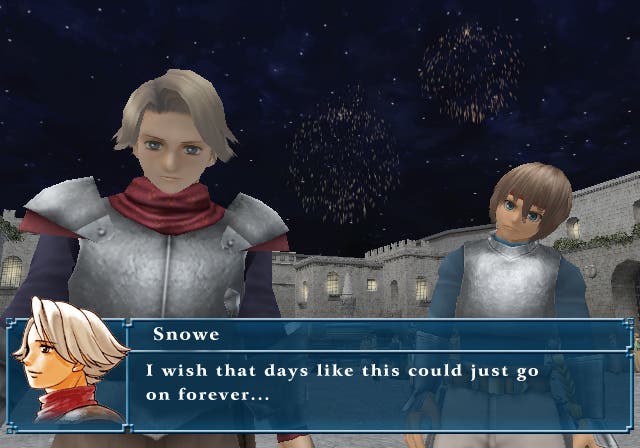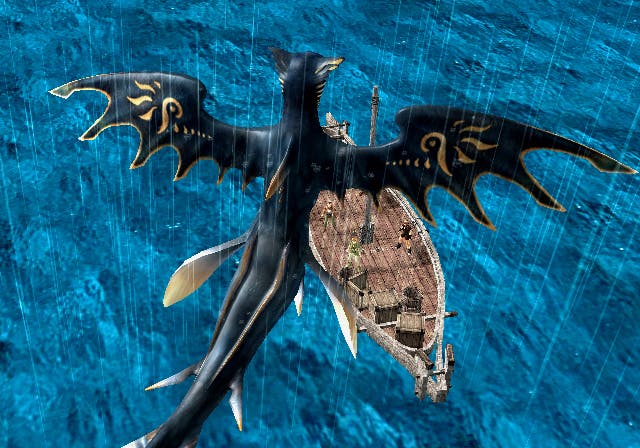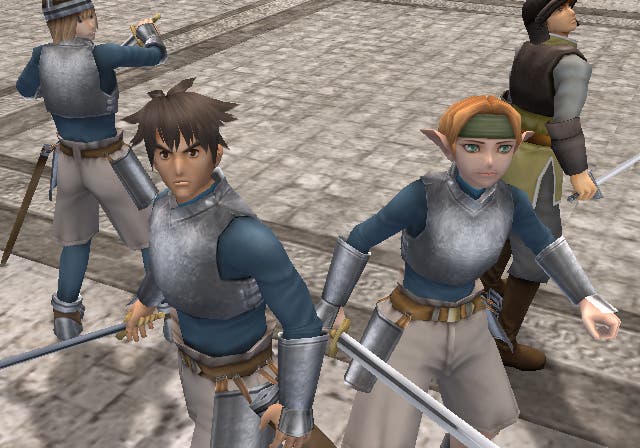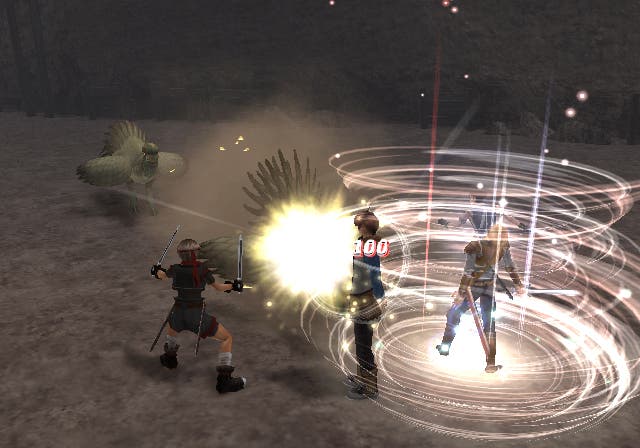Suikoden IV Review
Hrm. It's hard to make pun of a name you're not sure how to pronounce. Traditional Japanese RPG... er... ATTACKS. Yes.

The thriving Japanese RPG genre is still a bit of a voyage of discovery for western gamers. The obvious international mega-franchise that is Final Fantasy aside, it's a genre full of smaller franchises and series which have a relatively long history in the Far East but which arrive on these shores like new and strange creatures washed up from the ocean's depths. Occasionally we discover something wonderful, like the fantastic Nippon Ichi games such as Disgaea and Phantom Brave, Aruze's dark and interesting Shadow Hearts titles, or Namco's superb Tales franchise, introduced to gamers in the UK via the excellent Tales of Symphonia last year.
Sometimes, though, a series lands on our shores that's... Well, a little less wonderful. The Wild Arms series, for example, certainly has its devotees, but it's a bit surprising that titles such as the epic and graphically stunning Xenosaga get passed over for European release while Wild Arms makes it out. Equally, we were a bit surprised when Konami informed us that we were going to get Suikoden IV on these shores, albeit for different reasons.
It's not that the Suikoden series isn't good. It certainly is, although we'd be slow to class it in the same bracket as the likes of Final Fantasy, Star Ocean or Tales. The original two games on the PlayStation were fantastic in parts, if somewhat disappointingly traditional in other respects, and Suikoden III - which was released in the USA, but not in Europe - gave the series a gloss of 3D polish and added a number of new gameplay elements and a unique three-perspective narrative style which set the game apart from the competition. It was still painfully old-fashioned in some respects, but it looked good, it played well and it attracted a healthy fanbase.

It never came out in Europe, though. Which is why we're a little surprised to see the next iteration of the series appearing here - not because of any narrative continuation, since you absolutely don't need to have played Suikoden III to enjoy IV, but because this is simply a less accomplished game than its predecessor in almost every way.
Let's get this clear from the outset [only on Eurogamer can the fifth paragraph still be the outset -Tom], though; Suikoden IV is not a bad game. It's not joypad-hurlingly frustrating, nor does it feature the laughably poor production values, horrific bugs and inconsistencies or genuinely dreadful plot and characters that you might expect from a bad RPG. This is quite clearly an RPG made by a hugely professional studio with a big budget and buckets of artistic, musical and story writing talent. It has production values many superior games would kill for.
Unfortunately, it's all been a bit... Misdirected, one might say. It ends up feeling like a step backwards after the three steps forward of Suikoden III.
Suikoden IV is set in and around an island archipelago, and places you as a young man who's about to graduate and become a knight. Through a series of actually quite interesting events, you end up cursed with an unholy life force-stealing rune, which sets the plot in motion and sees you travelling the world to uncover the 108 Stars of Destiny, characters who will join you on your quest to unlock the secret of the runes and... Well, there's an aggressive empire and a whole lot of other stuff going on, but you get the picture.

Positive things first: the plot is fantastic. The pace can sometimes be inconsistent, but as RPG plots go, Suikoden IV boasts a corker. The scenario writers, to their credit, have accomplished the difficult task of weaving together a large number of stories and subplots in an intelligent and enjoyable way, and the characters that traverse the various story strands are largely well-developed and free of the tired old clichés which infest many RPGs. Best of all, personal stories are brought to the fore along with overarching plotlines, and the writers have a real knack for making relationships into the basis of conflict and storytelling.
Unfortunately, moving through that plot is less entertaining than it could be. Things begin to fall down a bit with the realisation that this is an RPG which is committed to being old fashioned in more ways than one. Firstly, there are the random encounters; far too many of them, in far too many zones, and far too unavoidable. This is an ancient game mechanism dating from the time when we couldn't display multiple sprites on screen at once; can game developers please stop clinging onto it like pieces of straw in a flash flood? Later in the games, the battles take less time to pass, but they're no less tedious, because your now-powerful characters are now being interrupted in their quests by load delays for battles which don't even give you any XP worth a damn. The turn-based battle system (which sees you using four characters, not six as in previous incarnations of Suikoden) isn't bad, but it's largely unremarkable rock-paper-scissors type stuff. Entertaining enough, but it looks a bit dry compared with the likes of Star Ocean, Tales of Symphonia and Shadow Hearts: Covenant, to name but a few recent RPGs that boasted fairly major updates to the battle formula.
If only that were Suikoden IV's only sin, we'd be content, but sadly it's not. The game also boasts one of the most brain-dead travel systems we've ever seen. The castles you built in the earlier games - populating them with the 108 Stars as you recruited them, and gradually expanding them and opening new facilities - have been replaced by a sailing galleon, which is a nice idea and works quite well, except that you have to sail it everywhere. Getting from one island to the next is a case of pointing in that direction and watching the galleon crawl towards the horizon at a sloth-like pace; and you'll spend rather a lot of time in the game staring at that screen. How this got into the finished game is a mystery on a par with the question of how the god-awful spaceflight sections got into Kingdom Hearts, but in Suikoden IV these sections are more frequent, and a lot more annoying.

Once you get to your destination, you might wonder why you bothered. Suikoden boasts a surprising disparity in its artwork - with gorgeous character designs, the occasional bit of incredibly imaginative and beautiful scenery... And then mind-numbingly bland environments in almost every town you'll visit. Carbon-copy houses and streets devoid of life aren't the kind of thing we expect from a modern RPG, and quite rightly so, but they seem to be the best that Suikoden IV can summon for most of its locations. Thankfully, the story is strong enough to keep driving you forward, because this certainly isn't an RPG that'll keep drawing you in with the level of visual imagination on display.
The game does boast great audio, which is another plus point - extremely competent English-language voice acting, and a superb orchestral soundtrack. However, this shows up one other curious element of the game - namely an entirely mute hero. I'm not opposed to the idea, but Suikoden III's central character had plenty to say for himself, as I recall - so why the sudden return to dumb silence, which seems especially stilted when so many of the plotlines focus on him and his relationship with those around him? It's not necessarily a major minus point, but it's an oddity, and enough people hate the mute hero syndrome to make it worth mentioning.
To give the game its due, it does improve as you play through it. Each new character added to the cast brings a certain something new to the mixture, watching your ship become a buzzing hive of activity is a lot of fun, and even the gameplay gradually picks up as you get to engage in more ship to ship combat (the sole innovation of this title in the context of the series as a whole) and - eventually- find a useful character who can teleport you places without the tedium of ship travel. Although obviously one of those negates the other somewhat, but it's nice to have a choice.
Suikoden IV, as previously mentioned, is by no means a bad game. It's just horribly average, with some hugely disappointing lows counterbalanced by some genuinely excellent high points. On balance, those high points outweigh the low points, and the storyline and characters make this into a game which we can, albeit with reservations, recommend to fans of the genre. Those new to Japanese RPGs, or with a low tolerance for the kind of outdated design elements that made the genre so inaccessible to newcomers for years, should look elsewhere for their fix.

